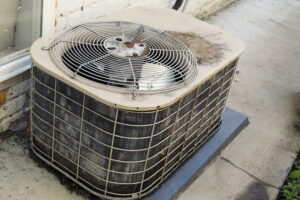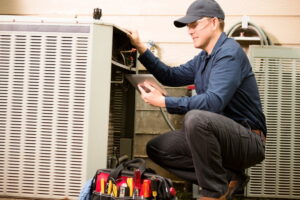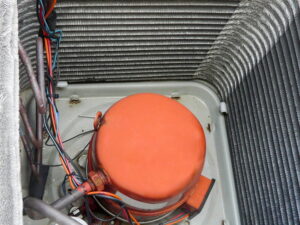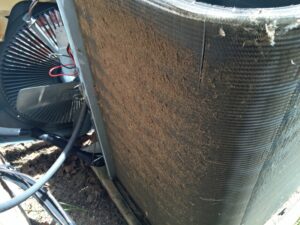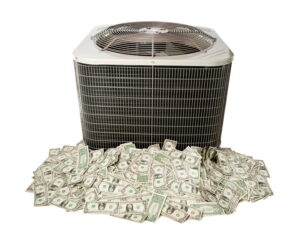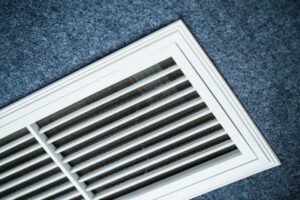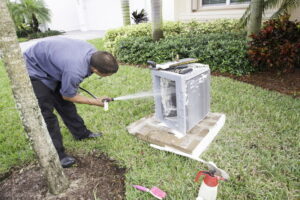Anything made of ferrous metal can potentially rust, and that includes your air conditioning system. Is this a common occurrence that you should worry about? And how would rust start to develop on an AC in the first place? We’ll get into that below, as well as help you know when you should call our team for AC repair in Lake City, FL.
Can My Air Conditioner Rust?
November 15th, 2021Failed Capacitors in Your AC: What’s Wrong, How to Fix It
November 1st, 2021After a long summer and fall of hard work keeping your home cool, your air conditioning system may start to run into trouble due to wear and tear. This is one of the hazards of living in a place with such a warm climate where ACs don’t get a long break during the winter. We have to be extra vigilant of how our air conditioning systems operate to catch potential trouble they may have between their regular maintenance visits in the spring.
One common trouble that ACs encounter after working through hot weather is with capacitors. Failed capacitors will bring an air conditioner to a halt. Below we’re going to talk more about capacitors, how to tell if they are failing/have failed, and what to do about it.
If the AC’s Compressor Fails, Do I Need to Get a New AC?
October 18th, 2021You may have heard that a failed compressor in a central air conditioning system means the whole system needs to be replaced. Compressors are critical for an AC’s operation—they’re responsible for circulating refrigerant and putting it under pressure so it can move heat out of the home and cool the air. Compressors are also large and powerful components that are expensive to replace. Since compressors often fail in older AC’s, it makes sense to replace the AC rather than pay just to replace the compressor.
However, a failed compressor doesn’t automatically mean a central air conditioner must be replaced. Not in all situations. Below we’ll look at four different outcomes for a failed compressor. This can help you make the choice about whether to have an AC replacement or an air conditioning repair in Lake City, FL, but please consult with our HVAC professionals to help you make the final decision.
What Are the Most Debilitating AC Malfunctions?
October 4th, 2021A busted AC is no fun in Florida heat. In fact, it can be dangerous if you have household members susceptible to heatstroke. This is why we take air conditioning repair in Alachua, FL seriously. When an air conditioning system isn’t working, people need expert help right away—and we’re available 24 hours a day, 7 days a week, 365 days a year to get cooling systems back to work.
We have more than two decades of history working on air conditioning systems, so it’s fair to say that we’ve seen it all. In this post, we’ll look at the AC malfunctions that cause the worst problems, i.e. ones that cause an AC to stop working entirely. We recommend calling us when your air conditioner is struggling, because we can help head off an even larger problem. But when you’ve got an AC that won’t work at all because of one of these problems, you’ll know you need to call us!
6 Common Causes of an AC Become Inefficient
September 20th, 2021A great air conditioning system does more than keep your house cool. It keeps your house cool without wasting energy. In other words, it runs efficiently.
But the same way that an AC can start to decline and provide less cool air, it can also start to become inefficient and waste energy. The two don’t even have to go together: you might still enjoy ideal comfort from your air conditioner yet see a tremendous rise in utility bills. If you have a problem with an inefficient air conditioner, you may need AC repair in Macclenny, FL—or possibly a new air conditioner!
What are the most common causes of an inefficient air conditioner?
- Clogged air filter: Dirty filters reduce airflow, forcing the system to work harder and consume more energy.
- Poor installation: Incorrect ductwork, system sizing, or drainage can quietly reduce efficiency over time.
- Lack of maintenance: Skipping annual tune‑ups allows efficiency to decline year after year.
- Leaky or damaged ducts: Holes or sagging ducts can waste up to 30% of cooled air before it reaches your home.
- Refrigerant loss and dirty coils: Leaks and debris buildup on coils strain the compressor and reduce performance.
- Aging equipment: AC units over 15 years old lose efficiency and may need replacement.
We’ll look at six ways an AC can become inefficient.
Closing Room Vents Isn’t Helpful: Here’s How It’s Hurtful!
September 6th, 2021“How can I pay less to cool and heat my house?” You’ve probably asked yourself this before, and you can find many options to lower how much you need to depend on running your heating and air conditioning system over the year.
One method you might try is to close vent covers in unoccupied rooms. This seems to make sense: blocking the flow of conditioned air to empty rooms means less energy used.
Except … this is completely false! Closing room vents (or blocking them) won’t save money on heating and cooling. It does the opposite: it costs money in energy efficiency, repairs, and failed equipment! We’ll take a look at why closing rooms vents is a destructive move for your HVAC system.
Is Late Summer Too Late for AC Maintenance? No!
August 23rd, 2021Did you forget to have maintenance done for your home’s air conditioning system in the spring? You may think that if you missed that window, you might as well skip it for the rest of the year. After all, it’s late summer, and if the air conditioner has already gotten this far…
We’re glad we’re here to stop that train of thought before you put off AC maintenance for a whole year. It’s late summer, but that doesn’t mean AC maintenance is a dead issue for the year. What might end up dead is your air conditioner, and far earlier than you expect, if you let maintenance slide. Spring is the best time to have a professional tune-up and inspect your air conditioner because it prepares it for the entire warm season, but if you get it done later it’s much better than never.
Ways to Tell Your AC Is on the Way Out…
August 9th, 2021We’re now in the second half of the summer, and your home’s AC has put in an enormous amount of work already cooling down the house. It still has a ways to go too, since the Florida summer heat can last long into fall. You shouldn’t have too much to worry about when it comes to your AC, provided you arranged for routine maintenance at the start of the year. ACs are designed to last for many years against extremely hot conditions.
Of course, no AC is designed to last forever. At this point in the summer season, you may detect signs that your air conditioning system is beginning to fail—headed for a last breakdown that will require you to schedule an AC replacement in Lake City, FL. The best way to avoid getting trapped with a failed AC is to pay attention to the warnings the system is on the way out. Below we’ve listed a few major signs.
What Are the Best Ways to Have Better Indoor Air Quality for My Home?
July 26th, 2021 Indoor air quality (IAQ) has never been more on the forefront of people’s minds than now. But poor IAQ has troubled homes for the last few decades: as construction creates more airtight houses to boost energy efficiency, indoor contaminants have fewer ways to escape, and less fresh air sweeps through to help keep the air clean. Chances are high that if you’re concerned about the IAQ of your house, you have good reason.
Indoor air quality (IAQ) has never been more on the forefront of people’s minds than now. But poor IAQ has troubled homes for the last few decades: as construction creates more airtight houses to boost energy efficiency, indoor contaminants have fewer ways to escape, and less fresh air sweeps through to help keep the air clean. Chances are high that if you’re concerned about the IAQ of your house, you have good reason.
Thankfully, you can find great help to improve your home’s indoor air quality. Our technicians have more than two decades of experience working to help North Central Florida homes enjoy the best IAQ. We’ve listed below a number of ways to improve your home’s air quality.
What Does “Tonnage” Mean for Commercial HVAC?
July 12th, 2021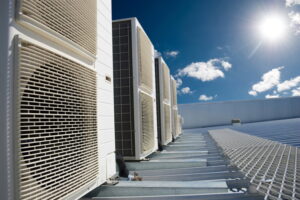 We offer service for light commercial HVAC in High Springs, FL. “Light” commercial means we work with AC and heating units that are 25 tons and under. No, that doesn’t have anything to do with how much the equipment weighs. The “tonnage” of a system is a bit more complex, and it has to do with the amount of heating and cooling an HVAC unit can provide.
We offer service for light commercial HVAC in High Springs, FL. “Light” commercial means we work with AC and heating units that are 25 tons and under. No, that doesn’t have anything to do with how much the equipment weighs. The “tonnage” of a system is a bit more complex, and it has to do with the amount of heating and cooling an HVAC unit can provide.
This applies to residential ACs and heaters as well, so even if you don’t own or operate a commercial facility, you may wish to stick around and learn about how professionals determine the amount of power necessary to provide climate control for a building.

